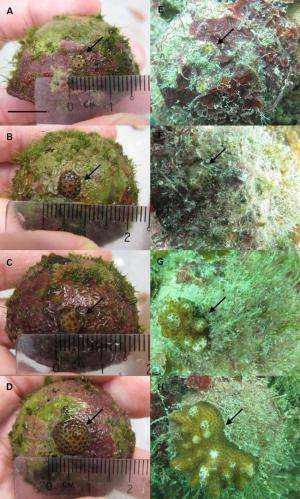Feeding increases coral transplant survival

Feeding juvenile corals prior to transplantation into a new reef may increase their survival, according to a study published June 4, 2014 in the open-access journal PLOS ONE by Tai Chong Toh from the National University of Singapore and colleagues.
The global decline of coral reefs and the loss of associated ecological services have necessitated immediate intervention measures to try to reverse their further deterioration. Scientists have attempted to recolonize damaged reefs by transplanting juvenile corals, but the survival of young corals on the reef remained low. To test if feeding juvenile corals in order to reach a larger size would improve post-transplantation survivorship, coral recruits were fed four groups different amounts of food (3600, 1800, 600 and 0 nauplii/L) twice a week for 24 weeks in an ex situ nursery.
The authors found that fed coral recruits grew significantly faster and larger in the lab than unfed corals. Juvenile corals supplied with the highest density of food (3600 nauplii/L) increased by more than 74 times their initial size. Once these coral were transplanted, the fed ones had significantly higher survival rates than unfed ones. The authors suggest that nutritional enhancement can augment coral growth and post-transplantation survival, and is an economically viable option that can be used to supplement existing coral transplant procedures and enhance reef restoration outcomes.
Mr. Toh added, "The results have underlined the feasibility of feeding juvenile corals as a supplementary measure to enhance coral transplant survival on the reef, and this could be applied to both aquaculture and restoration efforts."
More information: Toh TC, Ng CSL, Peh JWK, Toh KB, Chou LM (2014) Augmenting the Post-Transplantation Growth and Survivorship of Juvenile Scleractinian Corals via Nutritional Enhancement. PLoS ONE 9(6): e98529. DOI: 10.1371/journal.pone.0098529
Journal information: PLoS ONE
Provided by Public Library of Science




















